
Friday, January 31. 2014
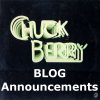
The main reason why this part of the Chuck Bery Collectors website is a weblog (or blog) is to open it for your responses.
Several articles here have had great input by readers, sometimes even resulting in heated discussions.
For a good research, discussions and input are essential. This is why you'll find some options to add your personal comment to an article.
Unfortunately I had to stop allowing comments to December's article on Berry's Christmas song. This entry was abused by a huge group of blog spammers. To reduce my work in reading and deleting their garbage, I had to disable the comments function. Right now comments are still open for the 140 other articles here. If you want to add a note to the Christmas song article, please send me an email and I'll post it as a comment here.
It's sad that once again spammers destructed a useful Internet function. But it's interesting to see how the bloggers vs. blog spammers fight escalates more and more.
In the beginning we had no blog spammers. So bloggers wrote articles and readers used the comments form to add their thoughts. Comments were printed right below the main article for everyone to see - and to further comment.
Spammers recognized this as a nice opportunity to post their own texts on other people's websites. Why do they do this? One reason is to display advertising for a product all over the web. Another reason is to display links to their own offers - good for two purposes: readers of the blog might click on a link, and search engines will find lots of links to the spammer's site which in turn rises their position in result lists.
So spammers wrote little programs to search for comments forms and fill those with advertising and links automatically.
Website authors found their pages spammed with advertising or unwanted links, so a counterstrike followed.
The solution was called CAPTCHA, short for 'Completely Automated Public Turing test to tell Computers and Humans Apart'. The idea was to automatically find out whether a comment was written by a human reader or by a machine. There are various types of CAPTCHA. All of them work with something people can easily do and machines can't. Things such as reading a simple question and answering it or recognizing shapes in a distorted image. This is why there is a graphic with my comments form which you have to understand and describe. If you can do so, you're supposed to be human and you are allowed to post a comment.
So we excluded spammers who used computers. Next for the spammers was to change to use humans. Computers looked for comments forms, then humans such as cheaply paid students were hired to fill in the form with the spammers' ads or links. Typically the comment was nice enough to read with the advertising hidden, such as here:
Doe? your blog have a ??nta?t page? I'm having problems locating it but, I'd like to shoot you an e-mail.
Where's the advertising? In the user name and user homepage fields (not shown here). And while such a comment is nice to read, we do not want to publish their ads and links on our pages.
The next solution was algorithms to select useful comments from advertising. Comments were automatically checked against certain words and phrases. If a comment was seen as advertising, it's automatically rejected.
Worked - for some time. Next the spammers learned to mis-spell the keywords so the algorithms would no longer find them. So I received comments that read like this:
I have got you bolk marked too look at neww stuff you post
At some point the algorithms were no longer useful and we had to return to manual approvement. With blogs having few comments such as this one, this is still an option. This is the reason why you cannot post a comment and immediately see it on this site. With every comment posted, first I'll receive a message from the blog software in which I need to approve or reject the comment. Worked for some time.
But even this does not work any more now. For some reason, the Christmas song article was found by spammers to be a valuable target. (I suspect is has to do with a Facebook post about it.) Within a few days I received dozens of spam comments to reject. Sorry, folks, but this is too much work for me!
Another interesting fact is that many spammers nowadays seem to use people who cannot read English at all. Outsourced to China? Have a look at comments like this:
Keep up the {superb|terrific|very good|great|good|awesome|fantastic|excellent|amazing|wonderful} works guys I've {incorporated|added|included} you guys to {|my|our|my personal|my own} blogroll.|{Howdy|Hi there|Hey there|Hi|Hello|Hey} would you mind {stating|sharing} which blog platform you're {working with|using}?
You see? This is a template from which the spammer should have selected alternatives. If he had understood what to do.
Anyway. I have removed the comments function from certain blog posts. If you want to comment on a topic which does not have a comments form beneath, send me an email to (cbguide at crlf dot de) and I'll make sure your input will be seen by other Berry collectors.

Sunday, January 12. 2014
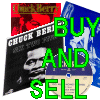
A very rare vinyl record containing a Chuck Berry recording only available there is currently for sale at eBay.
Look at item 230969781717.
This promotional record contains radio spots recorded to support the 1975 NAPRA Get Off anti-drug campaign. There are 51 radio spots on this record, one spoken by Chuck Berry. For more details read the chapter on Radio Show and Promotional Records of this site.

Wednesday, November 20. 2013
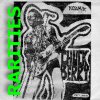
In the 1950s everything was simple: Singles had to run two minutes or 2:30 the max. Albums were just a collection of singles plus some tracks too bad for a single release.
In the 1960s albums became an artistic concept on their own. Singles were selected from the album tracks. And because album tracks often became longer and longer, record companies edited album tracks down to a running time reasonable for radio stations to play. That was something in the area of 3 to 4 minutes. By the way: According to The History of the 45 RPM Record, the longest 45 rpm track ever released was Bruce Springsteen's Incident on 57th Street (1987).
When collecting Chuck Berry records, you will find a couple of single edits. The most well-known is of course My Ding-A-Ling which was 11:52 on the original album and cut down to 4:16 for the famous #1 single. Ding-A-Ling has been re-issued on CD multiple times, so getting both the album version and the single edit is easy. However, some single edits are quite rare to find and you need indeed get yourself the original 45 rpm single to listen to the shortened version.
Here's a table of tracks which have been edited to fit on a hit single. Not included are the many album tracks which have varying lengths on CDs or LPs due to different fades or space restrictions. | Year | Song | Original album track | Shortened single track |
| 1964 | Chuck's Beat | 10:36 on Two Great Guitars (Checker LPS-2991) | 2:55 on Checker 1089 |
| 1964 | Bo's Beat | 14:04 on Two Great Guitars (Checker LPS-2991) | 2:55 on Checker 1089 |
| 1969 | It's Too Dark in There | 3:53 on Concerto in B. Goode (Mercury SR-61223) | 2:58 on Mercury 72963 (promotional release only) |
| 1972 | My Ding-A-Ling (live) | 11:52 on The London Chuck Berry Sessions (Chess CH-60020) | 4:16 on Chess CH-2131 |
| 1972 | Johnny B. Goode (live) | 4:38 on The London Chuck Berry Sessions (Chess CH-60020) | 3:53 on Chess CH-2131 |
| 1972 | Reelin' and Rockin' (live) | 7:10 on The London Chuck Berry Sessions (Chess CH-60020) | 4:19 on Chess CH-2136 (US version)
4:30 on Chess 6145 020 (UK version)
2:42 on Durium LdA-7811 (Italian Jukebox version)
4:55 on Chess CH-25002 (French version, faded only, not edited) |
| 1973 | Bio | 4:21 on Bio (Chess CH-50043) | 3:45 on Chess CH-2140 (US version only)
full length in all other countries |

Monday, November 18. 2013

A small note first: Sorry for no posts since September - I've been busy.
Most Chuck Berry discographies including Morten Reff's The Chuck Berry International Directory are certain that there were five original singles released during Berry's stay with Mercury Records:
- Mercury 72643 - Club Nitty Gritty / Laugh and Cry
- Mercury 72680 - Back to Memphis / I Do Really Love You
- Mercury 72748 - It Hurts Me Too / Feelin' It
- Mercury 72840 - Louie to Frisco / Ma Dear
- Mercury 72963 - It's Too Dark In There / Good Lookin' Woman
I have to disagree. I know of and have copies of the first four singles. But after collecting Berry records for decades, neither I nor anyone I know has ever seen a regular release of Mercury 72963.
All one can find is a promotional copy of Mercury 72963 having a white promo label and - if you're lucky - having a white sleeve containing a note to reviewers that this is the side [sic] from the Concerto In B. Goode album YOU (the reviewers?) requested.
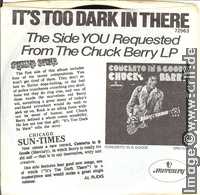
So yes, there is a 45rpm single containing It's Too Dark In There / Good Lookin' Woman. And yes, the label says Mercury 72963. But no, this was never part of Mercury's sales catalogue. And no, this was never released as a regular release other than this promotional copy.
If you disagree, please prove me wrong by sending a scan of a regular commercial label of this record.

Saturday, September 14. 2013

You'll certainly know that Amazon not only sells lots of Chuck Berry CDs and some vinyl, but also offers almost all Chuck Berry recordings as MP3 downloads. This site's Listen-to-it function makes use of these offers by presenting audio samples of most Berry recordings. Here's for example Amazon's selection for Wee Wee Hours. Amazon has roughly 14.000 MP3 tagged with Chuck Berry one way or the other.
MP3s at Amazon usually cost 99 cents per song. If you get them from other legal sources, prices are roughly the same. If we assume that Chuck Berry and his publishers get a share of this, that's not a bad deal.
The only other and cheaper way to legally get your favorite Berry recordings for use in MP3 players is to buy the corresponding record or CD and to convert the contents into digital MP3 files. This is done by a process called 'Ripping' and despite its name, this is perfectly legal as long as you keep the MP3 files for your private use.
But did you know that Amazon also provides you with all these MP3s for free? I didn't and was astonished to learn about it when I received an email from Amazon a few weeks ago.
The feature offered Amazon calls "AutoRip" and this is what they do: They automatically rip CDs into MP3 files. If you buy a CD tagged as "AutoRip" (and many Berry CDs are), they automatically and for free create MP3s of all songs contained. You can then import these MP3s into your Amazon Cloud Player (which every Amazon client has). From here you can listen to the songs or download them for use with your MP3 player Unless your cloud player contains more than 250 songs, this complete process is free of charge for you.
If you recently (i.e. within the last years) bought a CD which has now been AutoRip'ed, you will receive an email from Amazon announcing that these songs have been imported into your cloud player automatically. In my case this was the "In the 50s" 3-CD set I wrote about in March. The price for this set is now 40 cents higher than in March, but it includes MP3s of all 70 songs. No need to rip them any more.

Thursday, August 29. 2013

Reader Brian just posted a note to an eBay offer of the famous "America's Hottest Wax" bootleg (Reelin' 001). For sale is the second version with the blue cover. Bidding starts very cheap at UKP 2.99. Here's the link: Item 261275338851. Thanks, Brian!

Thursday, August 22. 2013
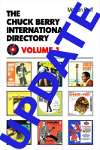
One, two - one, two, three, four ...
If you are following this site, you will have waited just like me to finally see the fourth and final volume of Morten Reff's The Chuck Berry International Directory.
With now over 2.000 pages, this is by far the most comprehensive and the most complete reference work for any serious Chuck Berry collector.
The earlier Volumes 1 and 2 of 2008 have 1,000 pages describing each and every Chuck Berry record issued in the U.S., in the U.K., or in any other country. The combined 19 chapters also covered bootlegs, movies, TV shows, books and much much more. Last year's Volume 3 presenting chapter 20 has 600 pages which list and describe all those records where some other artist recorded their own version of a Chuck Berry song.
Now we can get Volume 4. It completes chapter 20 with an index over song titles so one could look up those who recorded Beautiful Delilah, for instance - which are 27 besides the Kinks.
Seven other chapters discuss cover versions which became hits on their own, recordings which are said to be cover versions, but aren't, and Soundalikes. Plus there are such obscure items as Karaoke CDs and games.
Even if you aren't that much interested in cover versions, you may want to buy Volume 4 as an addition to Volumes 1 and 2 which you surely have. Since the original release in 2008 there have been additional important releases of Berry material (as you've read here). Also some older records have surfaced which did not make it into the first versions. Due to this, 200 extra pages in Volume 4 contain additions and corrections to the earlier volumes. Also included is cross-referencing information which allows you to easily find a certain record or release on these 2.000+ pages.
No need to repeat my recommendation: The whole series is a MUST-HAVE!
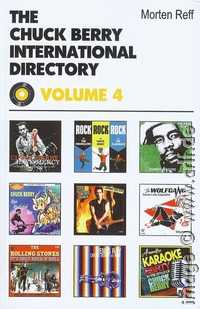

Friday, March 1. 2013

As you know, some of the more interesting Chuck Berry record rarities are those produced exclusively for radio stations. This site has a complete section on these records at Radio Show and Promotional Records.
Since Morten Reff's "Chuck Berry International Directory, Vol. 2" (see here) was issued, I had always wondered why on page 523 Morten lists the "Royalty of Rock - Berry/Richard" album as an 1983 release, while my copy clearly states 1982. Now I know why!
There are TWO versions of this radio show record:
#1 (c) 1982 TM Special Projects
has a black and white label with "Royalty of Rock" printed in a gothic font. The two sides are labeled Segment 1/Segment 2 and Segment 3/Segment4.
The cue sheet has the "Royalty of Rock" logo (with king's crown) printed in red. It lists opening and closing narratives to be read by the station's host. These parts of the segments are not on the record. Side 2 therefore directly starts with "Reelin' and Rockin'" and ends with "Johnny B. Goode".
#2 (c) 1983 TM Programming
has the crown logo printed in red as well as name and address of RKO Radio Networks. The two sides are labeled Side A and Side B.
It contains the same music and interviews as #1, but in addition has the opening and closing narratives spoken by some "Billy Juggs" (who was a DJ with KMET of LA). Thus side 2 starts with Juggs saying "You're listening to ..." and ends with "Chuck Berry is one of the true legends in The Royalty of Rock".
If you know more about TM Programming and the RKO radio albums, feel free to comment here.

Monday, November 19. 2012

We haven't heard or read anything new from Chuck Berry for many years.
So this recently published piece of Berry poetry is the latest (and maybe last) demonstration of Chuck Berry's wit and wisdom and it pretty much explains why.
Give you a song, I can't do that.
My singing days have passed.
My voice is gone, my throat is worn,
and my lungs are going fast. You can read the complete interview with Ohio's Cleveland.com here: http://www.cleveland.com/music/index.ssf/2012/10/chuck_berry_is_worried_about_h.html
Thanks to Owen for passing the link!

Thursday, October 25. 2012

The Chuck Berry International Directory by Morten Reff is becoming the most comprehensive and the most complete reference work for any serious Chuck Berry collector.
Volumes 1 and 2 of 2008 have 1,000 pages describing each and every Chuck Berry record issued in the U.S., in the U.K., or in any other country. The combined 19 chapters also covered bootlegs, movies, TV shows, books and much much more.
Now there is Volume 3 presenting chapter 20 which has 600 pages on its own. This issue of the Chuck Berry International Directory lists and describes all those records where some other artist recorded their own version of a Chuck Berry song.
Paul McCartney's Yesterday is said to have been recorded in 2,200 cover versions. Berry's Johnny B. Goode must come on one of the next places as Morten Reff here lists 648 recorded versions. And from this book we learn that McCartney and the Beatles made one of them. In addition the Beatles recorded and officially released 16 further Berry covers, while the Stones only have 11.
Morten Reff included just the official releases, not counting any bootlegs or such. Still then, the book lists more than 2,400 artists having recorded one or more Berry songs.
In contrast to the Beatles which besides Yesterday don't have many songs covered that much (if you excluded tribute bands), it's highly interesting to learn that almost 20 Berry songs have been covered at least 100 times, with Memphis, Beethoven and Sweet Little Sixteen following Johnny B. Goode on the list.
As with the other lists, Reff included much more than just dates and catalog numbers. There's a short paragraph for each artist and for most of the recordings there's one or more additional paragraphs describing the recording or its use. Photo pages present the most interesting sleeves.
Again this has been a tremendous amount of work. It is a fun to browse thorough it or look up famous artist's names. I wish there had been an index over song titles as well so one could look up those who recorded Beautiful Delilah, for instance. But according to the author this index had to wait for Volume 4 due early next year. The size of the book at more than 600 pages did not allow putting it in.
As with the other volumes of this series there's only one recommendation: Hurry up and get you one! Here's some shops: Click here!
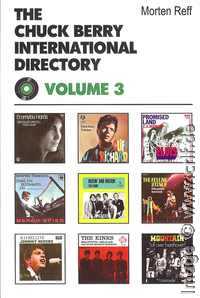

Monday, August 6. 2012
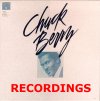
Recently a reader referred to my blog article on La Juanda - back here.
Again there rose a discussion about whether there are two variants of this song, or not: Is the version of this song on the original Chess single (Chess 1664) different from the version used on the LP albums (and all of the CDs)? When this question last came up in 2008 I had listened to those records over and over and did not hear any difference. In contrast others, especially Berry expert Morten Reff, insisted in hearing a difference. When this topic now came up once again, I decided to finally sort this out. So I grabbed the versions into audio files and used several computer programs to analyze possible differences.
Finally I stand corrected! Indeed there are differences in the single version of La Juanda versus to album and CD versions!
Both records obviously use the same basic take having the musical instruments and the main vocal. This results in both versions having the same length and sounding exactly the same.
However, as you will know, on this record Berry sings with himself in harmony. This was done by overdubbing a second background vocal track onto the original recording. And here is where the differences can be spotted. Either the engineers used a different second vocal track for the single or they modified the background vocal track before including it.
Fact is that there are a very few seconds in this song where you can hear the two versions differ. The most prominent part is during the first refrain where Berry switches from Spanish to English singing "I speak only the language of English" (close to 0:40 minutes in the song). In the single version this sentence is sung as a duet of Berry with himself having clearly two vocal tracks. In the LP version (e.g. on the Hip-O-Select box) the same sentence is not double-tracked. Here Berry clearly sings alone with a single voice.
My apologies to all those with better ears. I added a note to the Chess records section of this page.
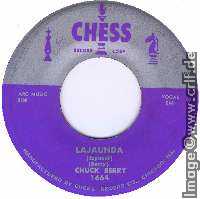

Saturday, June 16. 2012
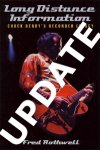
Fred Rothwell's Long Distance Information: Chuck Berry's Recorded Legacy (Music Mentor Books, 2001) is the ultimate book for any serious Chuck Berry record collector: All Berry sessions, all the songs, all the session musicians, where to find which song if ever released, and tons of additional stuff.
First published in 2001 the book consists mainly of a 240 page commented "sessionography", a list of 93 recording sessions Chuck participated in between 1954 and 2000. For each session Fred lists the musicians and the songs recorded, whether released or not. For every song he shows a few main records containing it. He also fully describes and criticizes every recording.
Since 2001 there have been several additional releases of old songs which Fred obviously could not list by then, but there have been very few discoveries of Berry recordings published before 2001 but not listed in Fred's book.
Therefore it was kind of a sensation when Morten Reff a few weeks ago found an unknown, unlisted Chuck Berry recording - on vinyl, from 1977!!!
Morten Reff is the author of the famous book series "The Chuck Berry International Directory" (Music Mentor Books, 2008) which is the other ultimate book for any Chuck Berry record collector. For details on the book series which documents and describes all Chuck Berry records ever released world-wide, read the Chuck Berry Bibliography on this site.
The recording Morten found is a complete song, studio-recorded with full band and the typical Berry intro.
This untitled song is a commercial for the Dr. Pepper softdrink and has been used in radio ads along with similar recordings from other artists. The ads and corresponding interviews have been distributed on an LP to the radio stations just like other radio spots in the 1960s and 1970s. For details on Berry-related radio albums, read the chapter on Radio Show and Promotional Records.
The album "Sights and Sounds of Dr. Pepper" (no label, no number) has a red-label and a blue-label side. The red-label side has 60-seconds radio commercials by Chuck Berry (actually 1:11 minutes), Lynn Anderson, The Mills Brothers, B. B. King, Hank Snow, Teresa Brewer, Dana Valery, and Gladys Knight & The Pips as well as six soundtracks to TV commercials. All artists sing the same lyrics, though in their own specific style, Chuck Berry in his.
The blue-label side starts with a 1:38 minute interview with Berry followed by the same song as on the red-label side, though this time starting with a countdown. The rest of the album is filled with interviews and songs by the other artists.
During the interview Berry talks about who influenced him (Nat Cole, Glenn Miller), what contributed to his success as a super rock-star, and about the taste of Dr. Pepper.
Congratulations to Morten Reff for this great find!
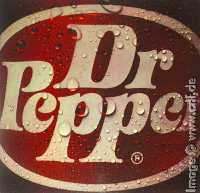 Addition: 04-08-2012:
Addition: 04-08-2012: Those of you who might want to listen to this commercial (though not to the interview) should get themselves the CD-R " Cola Radio Commercials Volume 3" which is available from ebay here: eBay link
Further edit: Both interview and song were included in Bear Family's 16 CD set of Berry recordings.

Saturday, March 31. 2012

There have been two articles on this blog already talking about Berry's session in Radio Bremen's TV studio on March 24th, 1972. Berry and the same band used a few days later to record the famous BBC TV session spent 45 minutes to record eight songs to be used in later German broadcasts. Three of these songs then made it to the May 27th, 1972 broadcast of Germany's most famous music show Beat-Club.
In 2008 I reported on a TV broadcast of additional recordings from this show and in 2009 some readers found yet another part of this session. Go back there to learn more about the recording and the original releases.
In early 2011 Gonzo Multimedia of London, UK announced to include this session in their series of "Lost Broadcasts" DVDs. Interestingly their description of the show was completely wrong, talking about three different sessions and about songs never heard of. Anyway I pre-ordered a copy which was supposed to be available in June 2011. It never came. Gonzo first delayed and then drew back the release completely.
But then some reader of this blog found out that the DVD has finally become available (Thanks, John!). I ordered once more and this time I really got the DVD!
Chuck Berry - The Lost Broadcasts (Gonzo Multimedia HST056DVD) is now available at the usual shops. Click here for a list. Despite what the shops may tell you: This is a single (not two) DVD and it is not an Audio CD. It says it's made in England, but interestingly the Gonzo/UK website does not list it, while the Gonzo/US website does - and with a much more correct description this time. And for even more confusion the printing on the front cover contains German notes (explaining that this DVD is unrated).
The DVD contains all eight songs recorded at the session. On the DVD are the raw cuts containing studio talk and even the clapperboard inserts. Included as well is a 30-minute Interview track, which consists of an interview where Berry tries to understand the questions from the two German interviewers followed by studio talk where the band sits on stage drinking beer. It seems as if the German cameramen and director simply let the cameras run whatever Berry and the band did. Which seemed not to disturb them. All this is now on the DVD, raw as it is.
This raw material was filmed in front of a blue-screen. This is a common technique in which during post-production any arbitrary background could be placed behind the actors. The blue color is then keyed out from the overlaid images. Here the blue background is very disturbing as by intention it has a very high contrast to what's going on on stage. When German TV broadcast this "Lost Concert" in 2008, they replaced the blue background with a black one. That was much more comfortable to view.
For the original 1972 broadcasts a distorted and modified view of the same image was placed into the background. The DVD includes both the raw and the processed variants of Let It Rock, Wee Wee Hours, and Johnny B. Goode. These three songs were used in the original Beat-Club show. Of School Day, which was used in a later German show, Gonzo missed to include the original broadcast.
Most of the contents of this DVD was known before, though in edited form. The beer-drinking scene (Berry drinking The Real Thing instead) is new as are some parts of the interview which until then had been used and even released on Audio CD in segments only. As Berry and the band are in good shape just like they are at the BBC session little thereafter, this is a nice-to-have item.
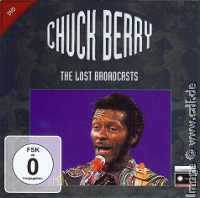

Sunday, March 18. 2012

 The release of various CD sets containing Chuck Berry's complete recordings of the 1950s and their sale at very low prices makes one wonder about the legal situation of these recordings.
In this blog article I try to explain the relevant copyright portions as far as I understand those. I am NOT an expert on copyrights, so what you read here may be completely wrong and subject to legal discussions. Thus feel free to comment or send an email if you find this text need corrections or additions!
Lets try to sort out some definitions first: we are talking about COPY-RIGHTS, i.e. the right to copy something. The basic rule in almost all circumstances is that the creator of a work of art is the only one who owns the right to create copies of his or her work. In most cases of commercially replicated art, the creator of the work has transferred the right to copy to an agency, a publisher or the like. Depending on the contract, this transfer of rights might be temporary, might cover certain editions or geographical regions only, or might be permanent. In any case the owner of the copyright (remember: the right to copy) might be someone different than the creator of the work. [Note: In the U.S. it had been necessary to officially register a copyright for it to become legally effective. This was often done by other parties such as a publisher. In Europe and most other countries the simple act of creating something automatically entitled the creator to the exclusive right to copy - as it is in the U.S. now as well.]
The creator of a work of art might also waive his right to copy by putting the work into the public domain. In this case the work of art is allowed to be copied freely. The creator might still have several rights which they retain. Thus they might still claim authorship, request their name to be listed, or request the work to be unchanged.
All copyrights expire. Thus after a certain amount of time every work of art becomes part of the public domain and is allowed to be freely copied. The period of time a work is protected against unwanted copying depends on the type of work and on the applicable laws. Due to this it often depends on the source country and on the country the copy is created in.
Looking at Chuck Berry's recordings, we see that there are three different kinds of art we have to consider: - The lyrics: The author of a song's lyrics just like any other poet becomes the primary copyright holder to the song text. In most countries, the author's copyright expires 50 or 70 years after his death. Thus in view of Chuck Berry, his song lyrics might be protected for a looong time in your country. In the U.S., lyrics written before 1978 were protected only for a mere 28 years after publication unless the copyright was renewed and extended to 95 years after publication. I don't know if the copyright to Chuck Berry's lyrics was registered in the first place and renewed within 28 years. If you know, tell me!
- The music: The creator of a musical composition is the primary copyright holder to the music. Copyright rules for melodies are the same as copyright rules for lyrics. Since in most cases Chuck Berry was both the writer of a song's lyrics and the composer of the song's melody, the same applies as before.
- The recording: The artist, in view of video recordings also often the producer, becomes the primary copyright holder to the sound recording. A recording is a work of art by itself. In legalese this is a derivative work. Copyright to sound recordings does not expire the same way as copyright to lyrics and melody. Instead in most countries the copyright to sound recordings expires 50 years after publication. However, in the U.S. sound recordings have not been considered copyright-able until 1972. Instead, sound recordings are protected by state law until 2067.
In respect to the various CD releases of Chuck Berry's 1950s recordings in Europe and in the UK, we can summarize: As a composer and writer, Chuck Berry or whoever he sold the copyright to (Chess, BMI, or their local agents) still is entitled to royalties. As a recording artist, his 1950s recordings are in the public domain, though - at least in the UK and at least those which have been published in the UK at least 50 years ago.

Wednesday, March 7. 2012

During the last weeks, SEVERAL CD sets appeared containing most or even all of Berry's 1950s recordings. There is a simple legal reason for this which I will cover in a different blog entry. Thus we can can be sure to see more of such re-releases over the years.
In any case, such re-releases will be of interest to customers only if they are complete, if they come with additional information, or if they contain rarities or unreleased recordings. Given that, let's have a look on the 3-CD set Chuck Berry in the 1950s (Chrome Dreams CD3CD5073, 2011).
Completeness: Yes, it contains every track released until 1960. The sequence is a bit odd as they chose to put the first four CHESS albums in their original sequence on the first two CDs. The third CD then combines the remaining tracks from singles which did not make it to the original albums. As with the other set discussed some weeks ago they mistakenly included the wrong version of Sweet Little Sixteen. Any unreleased tracks from the 1950s have not been included.
Additional Information: The box comes with a nice 16-page booklet containing photos (some rare) and a well-written lengthy story by Charles Waring.
Rarities: The additional 'bonus' tracks include the Ecuadors and Alexander recordings plus one of the two 1956 live tracks. These aren't really rare in contrast to the two live recordings with John Lennon from 1972. These recordings for the Mike Douglas TV Show broadcast 16 February 1972 can be found on many Vinyl bootlegs, but to my knowledge are here for the first time on a legal CD.
Unreleased Recordings: While there are no unreleased musical recordings on this CD set, we do find four interviews which have not been published on audio CDs or Vinyl records before. Despite the CD title, this is Chuck Berry in the 1970s and 1980s. - There is the interview from the same 1972 Mike Douglas TV show with Berry, Lennon and Yoko Ono. This has been available on video and DVD before, though not on audio.
- Next is an eight-minute segment from the John Davidson Show broadcast originally on 15 October 1980. This segment has been available on YouTube for some time but then pulled for legal reasons.
- The interview labeled FM Radio 1983 was in fact recorded backstage at the Sam's Town Hotel in Las Vegas on 15 October 1983. Steve Goddard talks about how he made this interview here. This is probably also the source for this audio track.
- Finally there is a seven-minute segment from Johnny Carson's Tonight Show of 5 November 1987. This is available on YouTube in case you want to see the complete show.
The Chrome Dreams three-CD set Chuck Berry in the 1950s is available from the usual Internet shops. For some offers, click here.
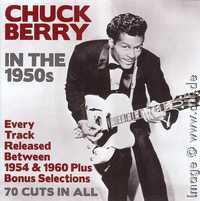
|












